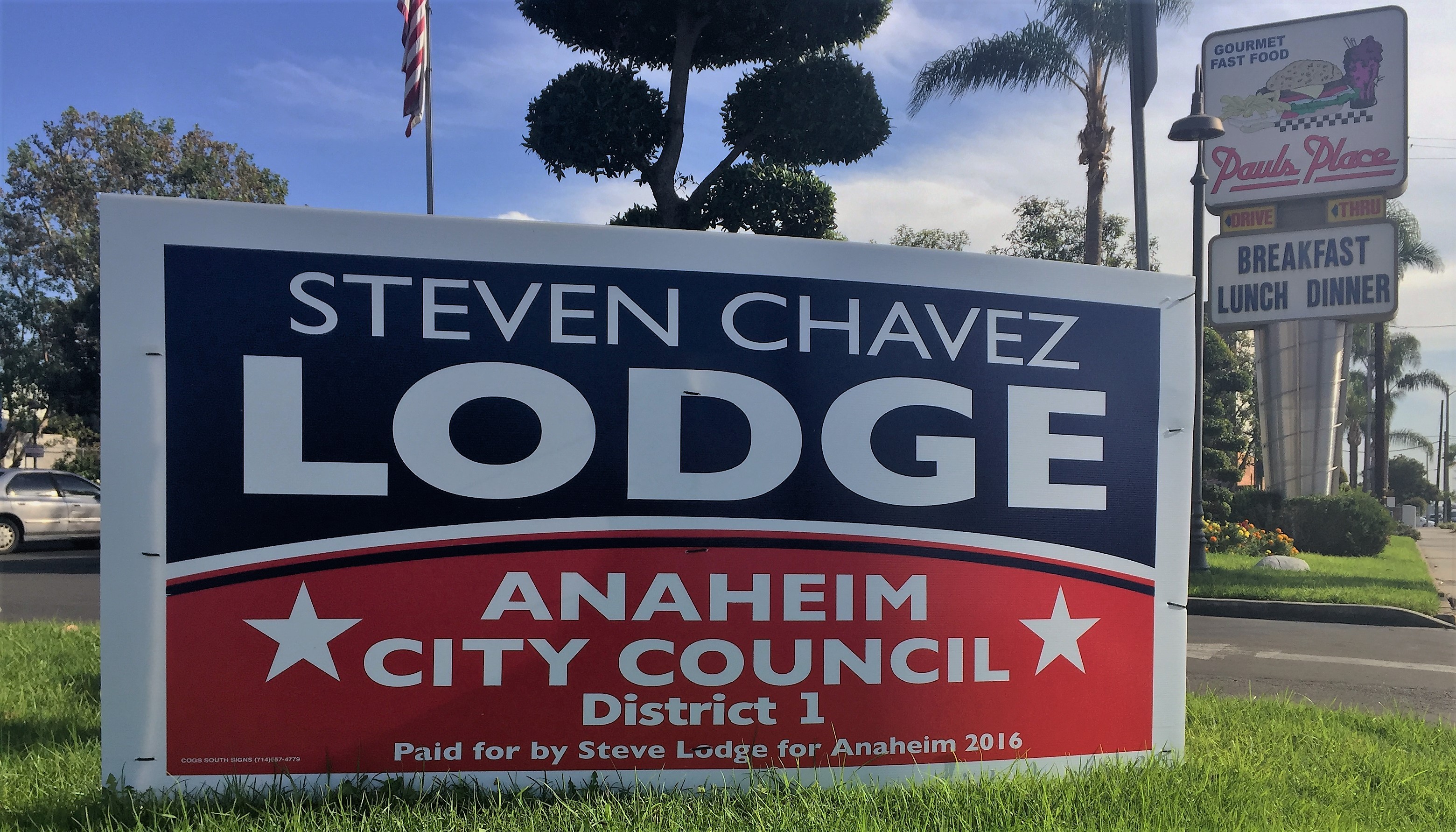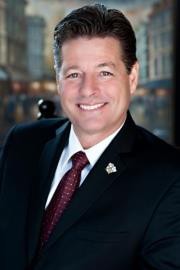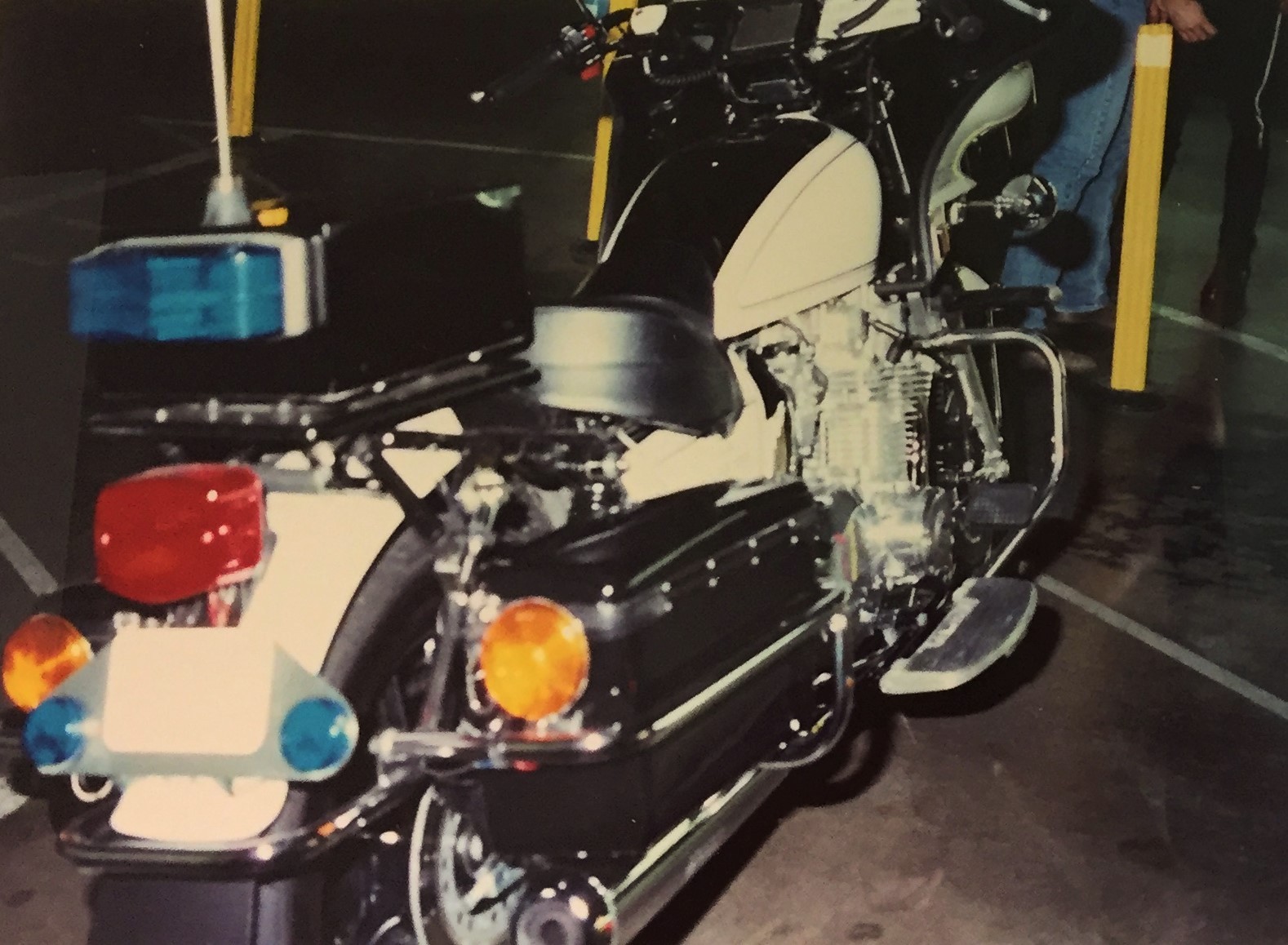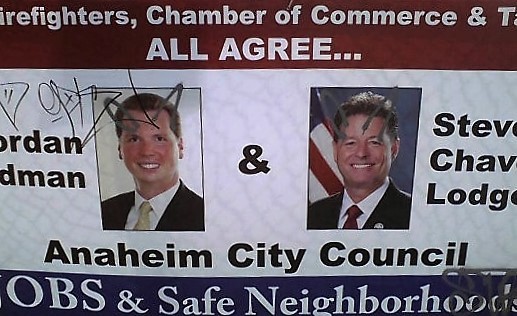 Steven Chavez Lodge prides himself as the law-and-order candidate in this year's Anaheim City Council race. "I am proud to have served with my brothers and sisters in blue for 28 years," Lodge wrote in a campaign Facebook post. "The rule of law must prevail."
Steven Chavez Lodge prides himself as the law-and-order candidate in this year's Anaheim City Council race. "I am proud to have served with my brothers and sisters in blue for 28 years," Lodge wrote in a campaign Facebook post. "The rule of law must prevail."
Running for District 1 on the city's West Side, the former Santa Ana police officer boasts of a career spanning three decades, including time as a homicide detective tasked with cold cases. Lodge's key endorsements read like a who's who in OC law enforcement, with District Attorney Tony Rackauckas, Sheriff Sandra Hutchens and retired Anaheim police chiefs blessing his bid, along with former Anaheim mayor Curt Pringle and other GOP heavyweights.
But there's a deep tarnish on Lodge's badge. Back in 1989, 27-year-old Iranian immigrant Hossein Farahani filed a federal civil rights lawsuit alleging the police officer beat him with a baton after jaywalking, which led to a ruptured disc and a gash on his head that needed eight stitches. A federal jury awarded Farahani $612,000—one of the largest such verdicts in Orange County history, and one of the few times local juries have gone against cops.
News of the lawsuit first resurfaced when Lodge launched a failed campaign for Anaheim city council in 2012. "I'm proud of my career as a police officer, and during that career in a tough city, there were times I had to use strong force to take people into custody," Lodge told the Orange County Register at the time. "People sometimes sue. But I never used excessive force."
Reporting on Lodge's dirty past during his 2012 run were based on old newspaper clippings, and not any actual documents from the Farahani case. But the Weekly has unearthed records from the original lawsuit, housed in the National Archives at Riverside, located in the city of Perris. They paint a picture of Lodge far worse than past newspaper accounts ever documented—especially the parts where the federal judge in the Farahani case accused Lodge of "outrageous behavior" and telling "bald-faced lies" on the witness stand.
 According to the original complaint filed by Farahani's lawyer, famed OC defense attorney Jerry Steering, Farahani walked across Fourth Street towards Grand Avenue in Santa Ana against a red light signal on May 2, 1989. On his motorcycle, Lodge rode over to Farahani and began yelling at him. Farahani fled from the cop, only to be stopped again. With limited English, the immigrant tried to comply with Lodge's commands, reaching into his wallet for identification but not quick enough for Lodge, per the complaint: It alleged that the officer cuffed Farahani, slammed his face onto the ground, and "beat and pummel[ed] Farahani with [his] billy club, fists and feet."
According to the original complaint filed by Farahani's lawyer, famed OC defense attorney Jerry Steering, Farahani walked across Fourth Street towards Grand Avenue in Santa Ana against a red light signal on May 2, 1989. On his motorcycle, Lodge rode over to Farahani and began yelling at him. Farahani fled from the cop, only to be stopped again. With limited English, the immigrant tried to comply with Lodge's commands, reaching into his wallet for identification but not quick enough for Lodge, per the complaint: It alleged that the officer cuffed Farahani, slammed his face onto the ground, and "beat and pummel[ed] Farahani with [his] billy club, fists and feet."
The $5 million federal civil rights suit alleged wrongful arrest, false imprisonment, gross negligence and battery, and included the City of Santa Ana, its police department and then-police chief Paul Walters. "It was the clearest excessive force case I've ever seen that didn't have any audio or video," Steering now tells the Weekly. He had practiced law just five years when he took on Lodge.
Defense lawyers countered by claiming Farahani ignored Lodge's commands and ran into an abandoned house to hide. They also claimed Lodge never intentionally struck him, instead blaming Farahani's injury on himself; according to the lawyers, Farahani tried to escape the officer, and ended up cutting his head on Lodge's right boot in the ensuing struggle.
The case landed in the courtroom of U.S. District Court Judge J. Spencer Letts, a Reagan nominee. Testimony from a forensic pathologist noted that Farahani's head wound came from a cylindrical object the size of Lodge's baton and swung with moderate force —any harder motion would've been skull-crushing. Lodge attorney James Parker, though, told the Orange County Register that their evidence showed "that Lodge at no time had a baton in his hand." The Los Angeles Times also wrote that Parker suggested it was possible that Farahani hit his head "on the bars welded to the body of Lodge's motorcycle." Included in the case records held in Perris are photos of Lodge's bike.
 "Lodge said he never hit Mr. Farahani with a baton, but we had a photograph of the side of his head, and it's a perfect baton mark," Steering says. At another point in the trial, he remembers that the defense called an elementary school crossing guard to the stand to testify she didn't see Lodge hit Farahani with the club. Still green as an attorney, Steering hadn't questioned her in a pre-trial deposition, but found his way around the witness anyway.
"Lodge said he never hit Mr. Farahani with a baton, but we had a photograph of the side of his head, and it's a perfect baton mark," Steering says. At another point in the trial, he remembers that the defense called an elementary school crossing guard to the stand to testify she didn't see Lodge hit Farahani with the club. Still green as an attorney, Steering hadn't questioned her in a pre-trial deposition, but found his way around the witness anyway.
"During cross-examination, I asked if she saw a crowd forming around Farahani," Steering recalls. The crossing guard said she did, then Steering asked if she had heard the crowd yell something. In front of the jury, the crossing guard admitted she did. "What were they yelling?" he asked. She responded: "'[Lodge] hit him with the stick! He hit him with the stick!'"
"It was the best thing I've ever seen in my life!" Steering now says with a laugh.
Jurors took less than six hours to find in Farahani's favor, and the Times described their verdict as "one of the largest [awards that Steering and Parker knew] of for a police use-of-force case in which the plaintiff suffered relatively minor injuries." Jury foreman Mark Spangler told the Register he felt Lodge hadn't been "telling the whole truth," adding "[Farahani] was on the ground, face down on the dirt," and that "there was no reason to hit him."
Lodge's lawyers told the press that Steering had "inflamed" the jury during closing arguments, and asked for a new trial. In response, Steering wrote in court filings that "the evidence…shows that the Police lied in their reports, bullied potential witnesses, exonerated [Lodge] in its Internal Affairs investigation of him, and lied to the jury about the events that occurred." Steering added that Lodge maintained in police reports, depositions and testimony that his boot inadvertently cut open Farahani's head, with no mention of a motorcycle whatsoever.
 Judge Letts denied Lodge's request for a new trial and upheld the damages awarded to Farahani, calling the legal challenge as one wrought with "confusion, conflict, and redundancy." He deemed the evidence in the verdict "overwhelming," but saved the most damning words for Lodge:
Judge Letts denied Lodge's request for a new trial and upheld the damages awarded to Farahani, calling the legal challenge as one wrought with "confusion, conflict, and redundancy." He deemed the evidence in the verdict "overwhelming," but saved the most damning words for Lodge:
In the court's mind, there can be little doubt that the jury was also outraged by the arrogance of the officer appearing on the stand and, in response to questions by counsel, trying to avoid the duty to compensate the plaintiff for his injuries by telling bald-faced lies designed to avoid liability entirely.
Letts continued that going easy on Santa Ana for damages would amount to having "the effect of reducing the cost of defending and, indeed, condoning reprehensible conduct." The city and Lodge appealed the decision to the Ninth Circuit Court in March 1991, but eventually settled with Farahani for $292,500.
After the settlement, Farahani got married and moved to Mexico. Steering continues his practice, specializing in police misconduct lawsuits, but hasn't talked to his former client in over 25 years. Judge Letts passed away in 2014, remembered by a colleague as "presid[ing] with a sharp mind and a compassionate heart." Lodge stayed with the Santa Ana Police Department through the 2000s, ending his law enforcement career with two civil lawsuits alleging excessive force, a federal lawsuit in which a bar owner claimed Lodge harassed her and her patrons, and another federal suit filed by Jimmy Plazola, who claimed Lodge had him wrongfully imprisoned for a year for on a murder charge that didn't stick.
Now running for Anaheim city council, Lodge is feeling confident in his chances thanks to district election reform. The late Judge Letts' harsh words for Lodge back in 1991 aren't on any mailers about Lodge yet, but serve as a prophecy of sorts for voters. "There seems little doubt," Letts wrote then, "that the jury intended to send a message that if [Lodge's] kind of conduct was condoned and defended, the price would be too high."

Gabriel San Román is from Anacrime. He’s a journalist, subversive historian and the tallest Mexican in OC. He also once stood falsely accused of writing articles on Turkish politics in exchange for free food from DönerG’s!

